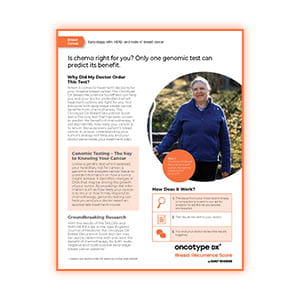How likely are you to benefit from chemotherapy? This short video can help prepare for your appointment with your doctor to review your Breast Recurrence Score® results.
Your Breast Recurrence Score results
Your results will be available to your doctor about 2 weeks after your tumor sample arrives at the Exact Sciences lab.* The results provide a Recurrence Score® result between 0 and 100 that says how likely your cancer is to return and predicts how much chemotherapy will help you.
* Testing performed at an Exact Sciences clinical lab in Redwood City, CA (Genomic Health, Inc.).
A low Recurrence Score result means the cancer has a lower chance of returning and you have a lower chance of benefiting from chemotherapy
A high Recurrence Score result means the cancer has a higher chance of returning and you have a higher chance of benefiting from chemotherapy
For example, patients with a high Recurrence Score result often choose more aggressive treatment options, including chemotherapy, than patients with low scores. It is important to understand that a low Recurrence Score result does not mean there is no chance that your breast cancer will return. And a high Recurrence Score result does not mean that your breast cancer will definitely return. So, your treatment decisions still depend on your unique situation and personal preferences.

“When I learned my Recurrence Score, it brought me instant relief that I was not going to have to do chemotherapy.”
Shelly W., breast cancer survivor and Oncotype DX® Ambassador
Recurrence Score result: 17

“The Recurrence Score test provided me assurance that I needed chemotherapy. I want to share my story to make sure patients hear both sides of the experience.”
Ellie T., breast cancer survivor and Oncotype DX® Ambassador
Recurrence Score result: 31
86%
of Breast Recurrence Score test patients have $0 financial responsibility†
This calculation includes patients with Medicare, Medicare Advantage, Medicaid, Managed Medicaid, and commercial insurance. Patient cost-sharing amounts, including deductibles and copays, will vary by plan and coverage type. Only your insurer can confirm if and how Breast Recurrence Score test will be covered.
90%
of Breast Recurrence Score test patients have a financial responsibility of <$100†
This calculation includes patients with Medicare, Medicare Advantage, Medicaid, Managed Medicaid, and commercial insurance. Patients with high-deductible plans may receive a bill for most or all the cost of the Breast Recurrence Score test if they have not satisfied their deductible.
† The numbers cited are based on historical patient billing data from 1/2/2023 to 12/29/2023. Rates of coverage vary by state and region. Exceptions for coverage may apply. Exact Sciences strongly encourages you to contact your insurer with questions about Oncotype DX Breast Recurrence Score test coverage.

